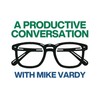
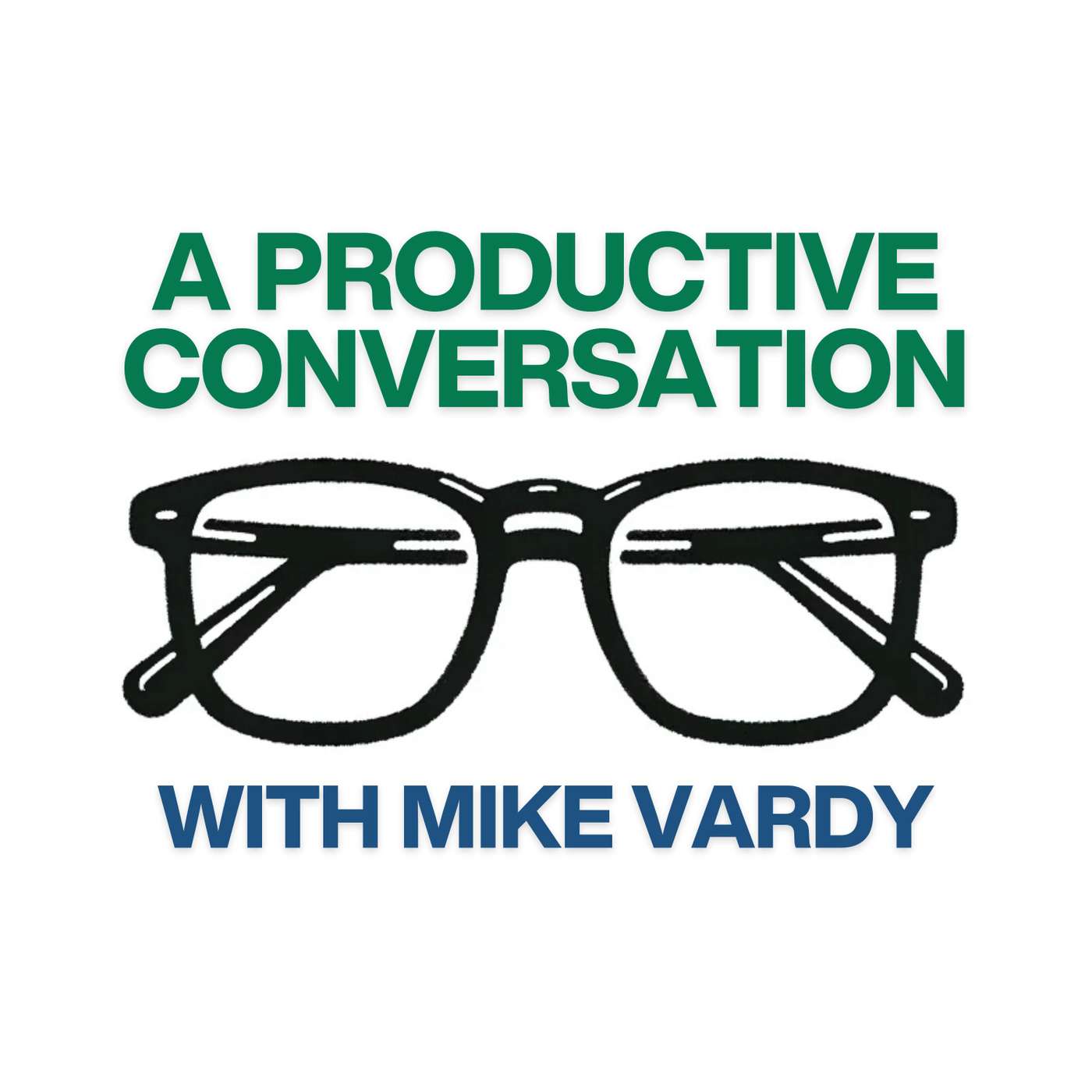
A Productive Conversation
Mike Vardy
Hosted by productivity strategist Mike Vardy, A Productive Conversation offers insightful discussions on how to craft a life that aligns with your intentions. Each episode dives into the art of time devotion, productiveness, and refining your approach to daily living. Mike invites guests who are thinkers, doers, and creators to share their strategies for working smarter and living more intentionally. From practical tips to deep dives on mindset shifts, this podcast will help you reframe your relationship with time and find balance in a busy world.
Subscribe and join the conversation—because a productive life is more than just getting things done.
Subscribe and join the conversation—because a productive life is more than just getting things done.
Episodes
Mentioned books
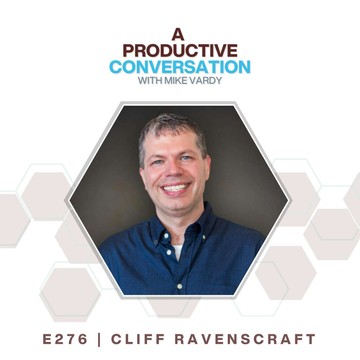
Dec 25, 2019 • 1h 2min
Freeing The Dream with Cliff Ravenscraft
On this episode of the podcast, I’m joined by Cliff Ravenscraft. For more than a decade, Cliff had been known as the Podcast Answer Man. He’s trained tens of thousands of individuals how to successfully launch an audio podcast. Today, Cliff is a business and life coach. He mentors coaches, consultants and thought leaders through the transition from their unfulfilling day job to their own responsible and profitable online business so that they can live the life of their dreams and do the work they feel most called to do in this world.
This is a longer episode than usual but it is jam-packed with inspiration – which is the perfect way to wrap up one decade and starting another. Cliff’s energy is palpable throughout as he shares with me his online business story, what the transition from one business brand to another has been like, and his evolving views on productivity over the course of the years. There’s a lot to unpack and you’ll want to just sit back and absorb everything Cliff dishes out over the hour-long conversation.
Talking Points
What has the journey been like for Cliff in the many years he’s been an entrepreneur
This is Cliff’s advice to anyone who is thinking about jumping into the online business world but wants to play it safe
What did Year One of Cliff’s online business story look like?
Cliff shares his burnout stories and why he experiences burnout during those times
This is what happened in Cliff’s world in September 2017… and it changed EVERYTHING
We talk about the transition from Podcast Answer Man to what Cliff is doing today
What the people in Cliff’s life thought about him abandoning his lucrative business
This is Cliff’s “mission statement”
What about Cliff’s health? What changes has he made there?
Cliff shares the workout routine that he committed to so that he could get his health in order
We start to spend time talking about… Cliff’s views on time
This is who Cliff learned from as he built his new business
What does Cliff think of the idea of the “overnight success story” today?
After Cliff recommended this book, I picked it up
Cliff takes notes on something I said here… and runs with it!
Here’s an alarming productivity tip…
We start talking about planning – especially regarding Cliff’s “Free The Dream” event
I share with Cliff the idea of the task-based mindset vs the time-based mindset
When it all boils down to it, this is really all Cliff cares about
Does Cliff have a team to help him out on an ongoing basis?
We end on what Cliff did and what he would recommend you do if you’re just starting out on your entrepreneurial journey
Quote
“Every day is today.”
Helpful Links
Cliff Ravenscraft
Think and Grow Rich
Episode 239: Free to Focus with Michael Hyatt
Social Media Marketing World
SPI 256: Productivity and Frameworks with Mike Vardy from Productivityist
The Prosperous Coach
The Big Leap
Free The Dream
BradyMade Events
This Changes EVERYTHING
mindsetanswerman.com/free
The Productivityist Podcast Pick fo the Week: Think Better, Live Better
After speaking with Cliff, he sent me a quick email that let me know there were things he shared on this episode that he had never expressed before. He said he “verbally processed a few new experiences” that he had never fully processed until our conversation. The big thing he shared was the idea that he’d been experiencing a flow state pretty consistently as of our conversation but hadn’t really been able to identify it as such until that point. I hope that our conversation helps you either process some new experiences or identify some of the blind spots in your life (hopefully it helps you with both of those things)!
Want to discover some of the books mentioned on the podcast? Check out Scribd, my reading app of choice.
If you enjoyed the episode, please leave a rating and/or review wherever you listened to the episode. Also don't forget to check out all of our podcast sponsors found on our podcast sponsors page.Learn more about your ad choices. Visit megaphone.fm/adchoices
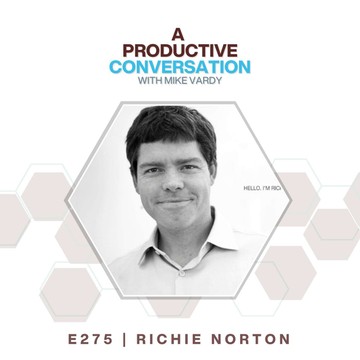
Dec 18, 2019 • 51min
Starting Something Stupid with Richie Norton
On this episode of the podcast, I chat with Richie Norton. Riche is the award-winning, bestselling author of the book The Power of Starting Something Stupid (in 10+ languages) and Résumés Are Dead & What to Do About It. In 2019, Richie was ranked one of the world’s top 100 business coaches by Dr. Marshall Goldsmith. He is an international speaker (including TEDx & Google Startup Grind) and serial entrepreneur.
I didn’t know what to expect when speaking with Richie but I can tell you that I didn’t expect the conversation to be so personal. We talk about why he loves bringing products to life, the axiom he uses as a guiding principle for his life, and solid advice when it comes starting something stupid.
Talking Points
We talk about the origins of his company name
What led Richie to want to bring products that they are proud of to life
Richie explains the origins and the meaning behind Gavin’s Law
This is far more powerful than any New Year’s Resolution
These are the two songs I have on nearly every monthly playlist I assemble
Richie and I start talking about whether or not it is stupid for me to make a planner
These are the people that will try to keep you from doing something stupid even though you feel compelled to do it
What about finishing?
These are the two questions Richie asks when evaluating ideas that he may want to bring to life
What’s the first thing you can do to start something stupid now?
Quote
“Live to Start. Start to live.“
Helpful Links
Prouduct
SwitchPod
The Freedom Journal
The Power of Starting Something Stupid
How to Keep a Library of (Physical) Books
The Road to Character
Richie on EOFire
I Got a Name by Jim Croce
Beautiful Ride by John C. Reilly
How to Live on 24 Hours a Day
Pocket Biases
Start Finishing
The Messy Middle
RichieNorton.com
The Productivityist Podcast Pick of the Week: Soul and Wit
Ask yourself this question if you’re afraid of starting something stupid: Will I regret it when I’m 80? If the answer is yes, then forge ahead. If not, then back away. But both Richie and I bet that more often than not you’ll want to forge ahead. You need to get out of your own way. You need to fight back against the biases that show up. You need to start something stupid a little more often. (And maybe start by looking at all of those web domains you bought.)
Want to discover some of the books mentioned on the podcast? Check out Scribd, my reading app of choice.
If you enjoyed the episode, please leave a rating and/or review wherever you listened to the episode. Also don't forget to check out all of our podcast sponsors found on our podcast sponsors page.
And if you want to have easy access to the archives of the show and ensure you don't miss the new episodes to come then subscribe to the podcast in the app you're using.Learn more about your ad choices. Visit megaphone.fm/adchoices
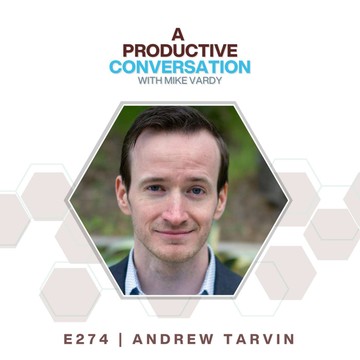
Dec 11, 2019 • 45min
Humor That Works with Andrew Tarvin
On this episode of The Productivityist Podcast, I’m joined by Andrew (Drew) Tarvin. Drew is the world’s first Humor Engineer teaching people how to get better results while having more fun. He has worked with 35,000+ people at 250+ organizations, including Microsoft, the FBI, and the International Association of Canine Professionals. He is a best-selling author, has been featured in The Wall Street Journal, Forbes, and FastCompany, and his TEDx talk has been viewed over 4 million times.
Drew and I talk about his book Humor That Works: The Missing Skill for Success and Happiness at Work. We discuss the ways you. can infuse humour into the workplace, why it’s important to bring hummer into the workplace, how you can overcome those who think adding humour to the mix is a waste of time, and more. As someone who has been immersed in humour in my previous life I was happy to have Drew on the program to talk have a comedic conversation that can take productivity to greater heights.
Talking Points
Drew shares why introducing humor is important at work and why fostering it is as well
Is Drew’s primary interest performing comedy or is it something else?
This is how Drew got started with improv
What is the goal of using humour in the workplace?
This is the definition of “humour that works”
How to deal with a “Beatrice” at work as opposed to a “Bill” at work
What is a “humour map”?
How can humour be used to diffuse conflict in the workplace?
What can leaders learn from stand-up comics?
These are Drew’s thoughts on authenticity in the workplace
This is one of the most important attribute you need in the workplace
What would Drew say to the person that thinks adding humour to the mix is a waste of time
31% of people leave their workplace because of this
Drew and I spend time talking about commitment
Why was it important for Drew to contract the book the way he did?
Drew talks about the “conversations” that he had with his editor throughout the book
Quote
“Many of you are likeable people… at home.“
Helpful Links
Humor That Works: The Missing Skill for Success and Happiness at Work
Bill Burr| Paper Tiger
HumorThatWorks.com
@DrewTarvin on Twitter
@DrewTarvin on Instagram
The Productivityist Podcast Pick of The Week: How Did This Get Made?
I’ve always believed that infusing humor in the workplace – and in life overall – is healthy and important. Being able to speak to someone who feels the same way and has taken the time to write an entire book on the subject was a real treat. I hope you enjoyed our conversation as much as I did (and, better still, I hope you had a few laughs along the way).
Want to discover some of the books mentioned on the podcast? Check out Scribd, my reading app of choice.
If you enjoyed the episode, please leave a rating and/or review wherever you listened to the episode. Also don't forget to check out all of our podcast sponsors found on our podcast sponsors page.
And if you want to have easy access to the archives of the show and ensure you don't miss the new episodes to come then subscribe to the podcast in the app you're using.Learn more about your ad choices. Visit megaphone.fm/adchoices
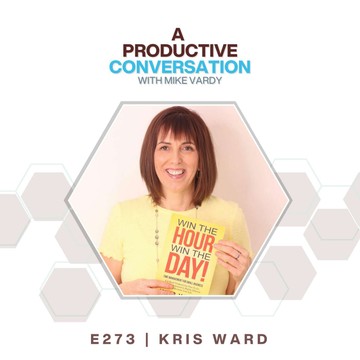
Dec 4, 2019 • 45min
How to Win the Day with Kris Ward
On this episode I speak with Kris Ward. Kris is the director of a marketing and branding company and it was through her work there that she learned a great deal about productivity versus being busy. Her work with other small business professionals lead to the creation of Win The Hour Win The Day.
Kris Ward helps entrepreneurs grow their business so they can get more work done faster and focus on what’s really important in life – and we touch on that throughout our conversation. We discuss the aspects of what she calls the “Freedom Formula” and a slew of other productivity-related topics. There’s a lot to absorb in this episode and I’m glad that us two Canadians finally had a chance to connect in podcast form.
Talking Points
What does productivity mean to Kris?
Kris has had several moments that have incited change in Kris’s life. Here’s one of them.
Here’s another one of those moments – a very different moment at that
Why winning the hour is vital to winning the day
We dive deeper into the idea of the calendar being your “time bank account”
This is how Kris likes to work
The biases that rear their ugly heads when we try to take on some of what Kris speaks of show up. Here’s how Kris helps people deal with that
Kris starts to break down the “Freedom Formula” in greater detail
Kris understands the resistance towards building systems
We start talking about tools
Is Kris more of a morning person or a night owl? And how can she help people listen to their body clocks with her work?
Kris believes this is something that we don’t talk about enough that affects our productivity
This is one thing that you can do now to start winning the hour and – as a result – win the day
Quote
“A business is not run on memory.”
Helpful Links
Win The Hour Win The Day!
The Checklist Manifesto: How to Get Things Right
Kris Ward on Instagram
Kris Ward on LinkedIn
WinTheHourWinTheDay.com
The Productivityist Podcast Pick of The Week: SW945: A Walk in Japan
It’s always a pleasure to speak with fellow time management experts. I’ve been following Kris on Instagram for a while now and there’s a lot of crossover in our work. I trust that you’ve heard that through our conversation on this episode. I think we brought a lot to the table and hope that you’ve garnered some solid takeaways from our discussion.
Want to discover some of the books mentioned on the podcast? Check out Scribd, my reading app of choice.
If you enjoyed the episode, please leave a rating and/or review wherever you listened to the episode. Also don't forget to check out all of our podcast sponsors found on our podcast sponsors page.
And if you want to have easy access to the archives of the show and ensure you don't miss the new episodes to come then subscribe to the podcast in the app you're using.Learn more about your ad choices. Visit megaphone.fm/adchoices
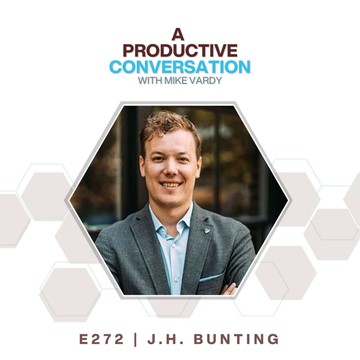
Nov 27, 2019 • 46min
Crowdsourcing Paris with J.H. Bunting
On this episode of the program I speak with J.H. Bunting about the life of a writer and the making of his ambitious new book, Crowdsourcing Paris: Memoirs of a Travel Adventure. J.H. Bunting (or “Joe” as I know him) is a bestselling writer, novelist, and a dad. He leads The Write Practice community, an award-winning community of creative writers. He lives in Atlanta, Georgia with his wife Talia and three kids and enjoys coffee and corpse reviver no. 2s.
Joe and I talk about the evolution of his book, the challenge of doing something different or outside of the usual path, how panic and desperation can fuel productivity, and much more. I had a great time learning about Joe’s process when building this book and I am happy to be able share our conversation with you.
Talking Points
Who is J.H. (Joe) Bunting?
This is how he got his start
What Joe discovered about the book while in Paris
How important was it for Joe to take on this book – something that was different than what he’d done before
Mark Twain played a role in the crafting of Joe’s book
We talk about the power of patience
Did every suggested challenge that Joe was asked to do while in Paris make the cut?
I circle back to the idea of panic and desperation and how it can spur on productivity
Does Joe believe in willpower?
Joe explains how beneficial it was for his productivity while away from his usual environment
Joe offers advice regarding traveling with a young family
Quote
“The important thing is that you’re doing the work and putting it out into the world.”
Helpful Links
Crowdsourcing Paris: Memoirs of a Travel Adventure
World Domination Summit
The Write Practice
Ryan McRae’s Burn The Tavern Down
The Innocents Abroad by Mark Twain
Episode 201: Willpower Doesn’t Work with Benjamin Hardy
Episode 266: Becoming Indistractable with Nir Eyal
Joe’s FREE Workation Adventure Worksheet
Daddy-Daughter Day: A Workday Vlog on TimeCraftingTV
The Productivityist Podcast Pick of the Week: The Good Place (The Podcast)
Writing a book is hard. Writing a book that falls outside of the scope of what you initially intended to write can be even harder. Joe took that on with passion and pride and the results show it. If you haven’t already picked up Joe’s book, do so now. It’s a fantastic read.
Want to discover some of the books mentioned on the podcast? Check out Scribd, my reading app of choice.
If you enjoyed the episode, please leave a rating and/or review wherever you listened to the episode. Also don't forget to check out all of our podcast sponsors found on our podcast sponsors page.
And if you want to have easy access to the archives of the show and ensure you don't miss the new episodes to come then subscribe to the podcast in the app you're using.Learn more about your ad choices. Visit megaphone.fm/adchoices
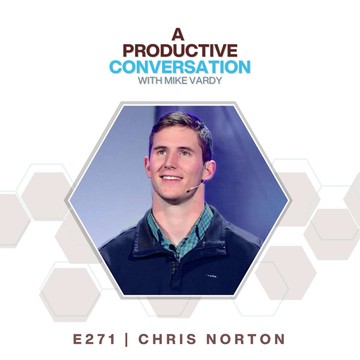
Nov 20, 2019 • 43min
The Seven Longest Yards with Chris Norton
On this episode I have the pleasure of speaking with Chris Norton. Chris is a speaker, author, adoptive & foster parent. He suffered a severe spinal cord injury playing college football. However, seven years later joyfully conquered the challenge of walking his wife, Emily, down the aisle of his wedding.
Chris spoke about his journey, chronicled in The Seven Longest Yards, a book he co-wrote with his wife. We also talked about being fathers, what productivity means to him, and so much more. Chris has overcome a lot and yet is incredibly productive and has an inspiring story to share. I’m pleased to be able to bring it to you on this episode of the program.
Talking Points
Chris shares a bit about who he is and why he no longer plays football
What did it take for Chris to show resilience in the face of tragedy?
This is the one thing that helps Chris stay so positive
Chris tells the story of the first time he tried to take steps since the accident
What primary lesson does Chris take from his football days that he applies to this day?
You need to learn how to do this – something that athletes know all too well
We talk about fatherhood and parenting – something Chris is incredibly passionate about
Chris shares why it was key for Emily and him to write this book together
What does productivity mean to Chris?
Chris has a challenge for you
We close out the show talking about the idea of regret… and how Chris fights back against the power of regret
Chris predicts the winner of Super Bowl LIV
Quote
“Who needs you to keep going so that they can keep going?“
Helpful Links
The Seven Longest Yards
Episode 245: What Happy Successful People Do Differently with Marc and Angel Chernoff
Chris on The Good Life Project with Jonathan Fields
Episode 269: You Are Awesome with Neil Pasricha
Episode 241: What Sports Can Teach Us About Greatness with Don Yaeger
The Front Nine: How to Start the Year You Want Anytime You Want
ChrisNorton.org
Chris on Instagram
The Productivityist Podcast Pick of the Week: Read to Lead
Chris’s story is inspiring to say the least. I’m so honoured that he took the time to come on the show and share his story with me… and with you. There are plenty of lessons to be learned from his experience and how he faced it. I hope you can take any number of them and apply them to your own life.
Want to discover some of the books mentioned on the podcast? Check out Scribd, my reading app of choice.
If you enjoyed the episode, please leave a rating and/or review wherever you listened to the episode. Also don't forget to check out all of our podcast sponsors found on our podcast sponsors page.
And if you want to have easy access to the archives of the show and ensure you don't miss the new episodes to come then subscribe to the podcast in the app you're using.Learn more about your ad choices. Visit megaphone.fm/adchoices
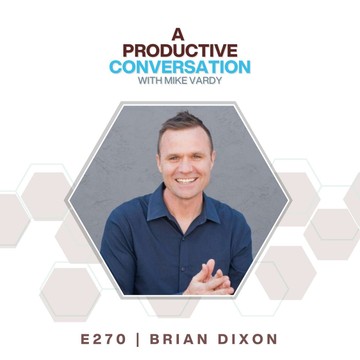
Nov 13, 2019 • 48min
The Daily Decision with Brian Dixon
On this episode, I’m joined by Brian Dixon, the author of Start with Your People: The Daily Decision that Changes Everything. As a podcaster, conference speaker, and business coach, Brian is passionate about helping high potential leaders and teams thrive in a world of overwhelming options.
Some of the things we discuss during our conversation include what people can do to make sure they are starting on the right foot with others, why putting people first plays a role in your productivity, and the things you can do so that you can start with people first.
Talking Points
Brian speaks about the idea of “deciding” and the concept of the daily decision
The nuanced approach to creating harmony between the needs of your people and your own needs
This is The One Hour Exchange… and how you make it happen in a way that works for you
What steps should someone take if they want to start off on the right foot when “starting with their people”
Brian loves personality tests. Here are the four he likes the best.
Brian challenges you to pick one day to do this
What does it mean to adopt a mentality of abundance?
I learned this about Mr. Rogers
What can you do to start starting with people today?
Quote
“The pebble rarely sees the ripple…my job is to make an impact on the people in my life and I will never necessarily know the impact that they make as a result of me impacting them. But I can hold my head up high or put my head on the pillow at night and say ‘job well done.'”
Helpful Links
Start with Your People: The Daily Decision that Changes Everything
Episode 203: The Evolution of Getting Things Done with David Allen
The Clarity Sessions
The Road Back to You: An Enneagram Journey to Self-Discovery
The Wisdom of the Enneagram: The Complete Guide to Psychological and Spiritual Growth for the Nine Personality Types
5 AM Miracle: The Daily Decision that Changes Everything with Brian Dixon
Episode 265: Bringing Gratitude with Karl Staib
Brian’s Website
The Productivityist Podcast Pick of the Week: Typology
I like this particular take on “people-powered productivity.” Why? Because it’s personal. Brian’s got some great ideas throughout the pages of his book and he shared quite a few during our conversation. I hope you get a lot out of it. I know that I did.
Want to discover some of the books mentioned on the podcast? Check out Scribd, my reading app of choice.
If you enjoyed the episode, please leave a rating and/or review wherever you listened to the episode. Also don't forget to check out all of our podcast sponsors found on our podcast sponsors page.
And if you want to have easy access to the archives of the show and ensure you don't miss the new episodes to come then subscribe to the podcast in the app you're using.Learn more about your ad choices. Visit megaphone.fm/adchoices
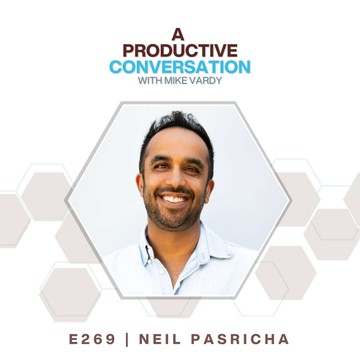
Nov 6, 2019 • 1h 7min
You Are Awesome with Neil Pasricha
On this episode of the podcast, I have the pleasure of being joined by the author of The Book of Awesome Series, Neil Pasricha. Neil thinks, writes, and speaks about intentional living and on this episode he’s going to share with me some of his insights from the book You Are Awesome: How to Navigate Change, Wrestle with Failure, and Live an Intentional Life.
Neil is a New York Times best-selling author of 5(!) books, selling well over a million copies of his books in the process. He also hosts the award-winning podcast – and foamier Productivityist Podcast Pick of the Week – 3 Books. He’s an in-demand international speaker and, like me, is a Canadian. Unlike me, he lives in Toronto with his wife and three sons.
We spend time during our discussion talking about his latest book and a wide variety of productivity-related topics for just over an hour, making this one of the longer episodes I’ve ever produced. So sit back, relax, and enjoy this conversation I have with Neil on the program. It’s, in a word… awesome.
Talking Points
Neil shares with me what You Are Awesome is really about
He shares why he started his blog
This is the difference between resilience and grit
We talk about the use of ellipses or the dot-dot-dot
These are the steps that you need to take to be awesome
We explore an all-too-common feeling: the feeling of not being good enough
Neil and I discuss the importance of failure
Does Neil journal?
Neil turns the tables and asks me about my journaling practice
When I share with Neil my TimeCrafting methodology he asks if I feel any sort of constraints surrounding it
I turn the tables back and ask Neil if he has any sort of daily theming practice that he uses
We close out the conversation by slowing things down a bit
Quote
“We have never been more productive – ever – than now.”
Helpful Links
You Are Awesome: How to Navigate Change, Wrestle with Failure, and Live an Intentional Life
Day One
What Got You Here Won’t Get You There: How Successful People Become Even More Successful
The Art of Non-Conformity: Set Your Own Rules, Live the Life You Want, and Change the World
The Pomodoro Technique
Neil.blog
3books.co
The Productivityist Podcast Pick of the Week: Akimbo
There’s a lot to unpack in this episode and so many great takeaways. It was refreshing to have the tables turned on me with a few questions and I know we could have spoken to each other for much longer. I encourage to give this episode a repeat listen – there are insights a-plenty to be found!
Want to discover some of the books mentioned on the podcast? Check out Scribd, my reading app of choice.
If you enjoyed the episode, please leave a rating and/or review wherever you listened to the episode. Also don't forget to check out all of our podcast sponsors found on our podcast sponsors page.
And if you want to have easy access to the archives of the show and ensure you don't miss the new episodes to come then subscribe to the podcast in the app you're using.Learn more about your ad choices. Visit megaphone.fm/adchoices
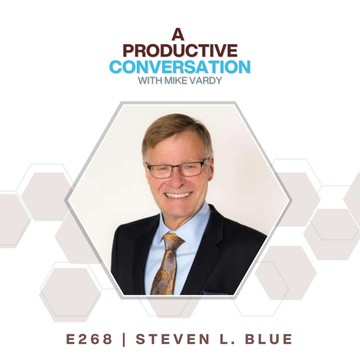
Oct 30, 2019 • 39min
Metamorphosis with Steven L. Blue
On this episode I speak with Steven L. Blue. Steven is the best-selling author of five critically acclaimed books that target executives, leaders, entrepreneurs, and anyone seeking to learn the secrets of success in the corporate world.Steven’s latest book, Metamorphosis: From Rust-Belt to High-Tech in a 21st Century World, is a detailed blueprint for CEOs and senior leaders to transform their businesses from failing rust-belt companies with small margins into high-tech leaders with superior profits.
I spoke with Steven about the shift from rust-belt to high-tech products, the patience involved when making a change, and the process of metamorphosis as a whole. There’s a lot to unpack in this episode and plenty of lessons that Steven offers that you should heed when undergoing organizational – or even individual – metamorphosis.
Talking Points
What metamorphosis means to Steven – and what Steven wanted to title the book in the first place
Steven discusses the idea of “innovational potential”
The surprising model that Steven believes you should follow when going through a metamorphosis
We talk about disruptive thinking and how important it is to adopt it
Would Steven hire a Chief Innovation Officer?
This is what Steven had his staff trained in years ago that has helped the company out in incredible ways
The impact Steven feels change has on productivity – and how he suggests a company combat any fears that arise from an initial loss in productivity when instituting change
We talk about the many forms that innovation can show up in your business and where he has it show up in Steven’s company
When and how does scale play a role in the metamorphosis of a company?
This is one of the toughest aspects of making change… no matter the size of your business
How much time does Steven spend in the planning phase?
Outsourcing is key – but there’s an important piece when you’re outsourcing to external contractors that Steven believes is a must
This is the biggest piece of advice that Steven says will help you get a decent start when you decide to undergo a metamorphosis
Quote
“Innovation should be everybody’s job.”
Helpful Links
Metamorphosis by Steven L. Blue
Steven’s Website
Steven on Twitter
The Productivityist Podcast Pick of the Week: Get Yourself Optimized
Even though you may not be running a manufacturing company like Steven does, there are still great takeaways regarding change that you can use in your own business – and life. Change is never easy but if you stand still then others will pass you by along the way… and you’ll spend time playing catch-up instead of investing it in what you need and want to be investing it in. If your intention is to make change that matters, then you need to plan for it so that you can be as ready as possible for whatever that new route will throw your way.
Want to discover some of the books mentioned on the podcast? Check out Scribd, my reading app of choice.
If you enjoyed the episode, please leave a rating and/or review wherever you listened to the episode. Also don't forget to check out all of our podcast sponsors found on our podcast sponsors page.
And if you want to have easy access to the archives of the show and ensure you don't miss the new episodes to come then subscribe to the podcast in the app you're using.Learn more about your ad choices. Visit megaphone.fm/adchoices
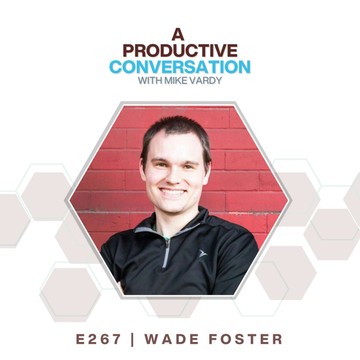
Oct 23, 2019 • 50min
Revisiting and Reframing Automation with Wade Foster
On this episode, I speak with Wade Foster. Wade is the CEO and co-founder of Zapier, a workflow automation tool used by over three million people to connect the work apps they use every day. Prior to Zapier, Wade worked as a customer development lead for The Idea Works, Inc. in Missouri. He is an alumnus of Y Combinator and has degrees in industrial engineering and business administration from the University of Missouri-Columbia.
I wanted to have Wade back on the show to explore the genesis of Zapier as well as how automation has worked for him over the years. We talked about his own to do list, who inspires and motivates him through their work and so much more during our conversation. I’m pleased to have him return as a guest on the show and hope you enjoy this revisited and reframed discussion.
Talking Points
Wade shares a bit about Zapier
Where has Zapier gone since its inception? How has it evolved?
Is there such a thing as “too much automation”? What trips people up when they are trying to automate?
Here’s what Wade thinks Zapier – and automation – is helping people focus on to help out with their productivity
Wade shares how you can make time to automate – and why you should
Here’s one thing that you can’t automate on the whole… but can automate in parts
How Wade started automating – and how he keeps at it
What automation has freed Wade up to do more of
Does Wade keeps a to do list? Here’s how he structures his weeks
How Wade breaks down big things – like projects
What about home or personal automation? What does Wade do on that front?
Where does Wade draw inspiration from?
These are the particular pieces of writing and content that Wade refers to consistently to stay on track
We talk about scale and how Zapier plans to scale
How does Jeff Bezos’s quote “Focus on the things that don’t change” play a role in Wade’s company and his own life
Quote
“The reality is that innovation and technology move so quickly that you always have to be looking for the next angle for yourself or you might find that your company is… innovated out of business.”
Helpful Links
A Closer Look at Automation with Wade Foster | The Productivityist Podcast
Thinking Fast and Slow
IFTTT
Signal v. Noise | Basecamp
The Hard Things About Hard Things
I Ran the Full Text of Jeff Bezos’s 23 Amazon Shareholder Letters Through a Word Cloud Generator, and the Insights Were Astonishing | Inc.com
1,000 True Fans | The Technium
The Innovator’s Dilemma
Zapier
The Productivityist Podcast Pick of the Week: Process
The thing about automation is that you need to think about not only what you want to automate but why you want to automate in the first place. Don’t just automate for automation’s sake. Software can help once you’ve made that call, but without making a smart and wise choice beforehand you may be setting yourself up for more work than you bargained for.
Want to discover some of the books mentioned on the podcast? Check out Scribd, my reading app of choice.
If you enjoyed the episode, please leave a rating and/or review wherever you listened to the episode. Also don't forget to check out all of our podcast sponsors found on our podcast sponsors page.
And if you want to have easy access to the archives of the show and ensure you don't miss the new episodes to come then subscribe to the podcast in the app you're using.Learn more about your ad choices. Visit megaphone.fm/adchoices


